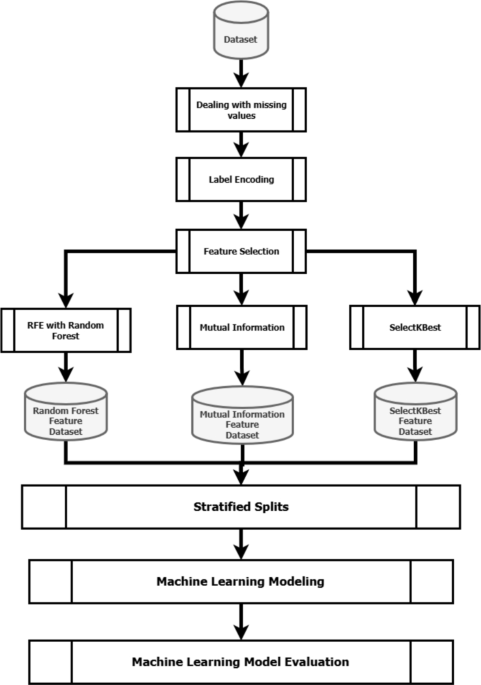How Kibra youth are turning trash into treasure
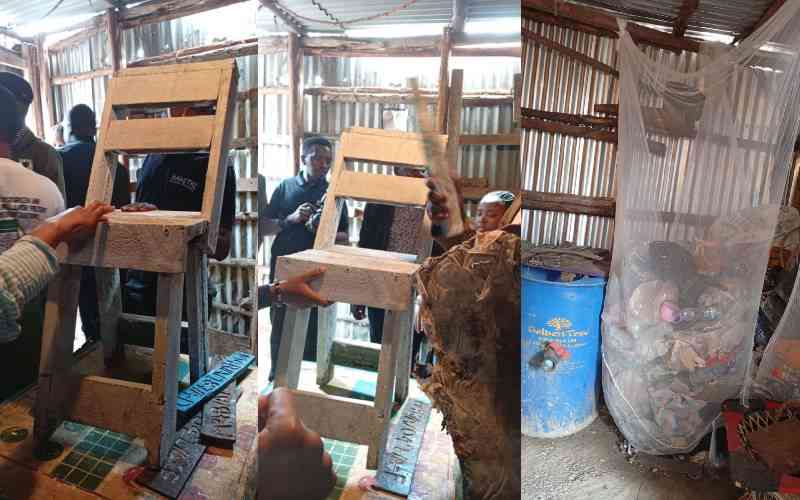
Entering Kianda Bombolulu in Kibera, Nairobi’s largest informal settlement, one is immediately struck by the overpowering stench.
The thick, unforgiving air is laced with the acrid mix of raw sewage, rotting waste and human excreta. Narrow, trash-strewn paths meander between congested iron-sheet houses and makeshift toilets.
It is here that members of the African Women’s Development and Communication Network (FEMNET) delegation recently found themselves coughing and covering their noses as they visited a beacon of resilience amidst squalor: a youth-led revolution turning waste into wealth.
Slums Going Green and Clean (SGGC), a community-based organisation, is on a mission to tackle Kibera’s waste crisis while uplifting its youth. Born in 2017 with just 10 youth cleaning 50 homes, SGGC has now grown into a structured initiative serving over 13,000 households with a team of 280 young waste pickers.
Among them are individuals like, Ali Yusuf David, Victoria Mutoo and 19-year-old Teddy Omondi, all of whom are not only waste pickers but also community health promoters.
Teddy, a waste picker joined the organisation in 2017, when the initiative was still in its infancy.
“We started out as just ten people,” he recalls. “Back then, we would only collect garbage from about 50 houses every Saturday. Today, we are over 100 members strong and we reach close to 3,500 households, starting every Saturday morning in Kianda.”
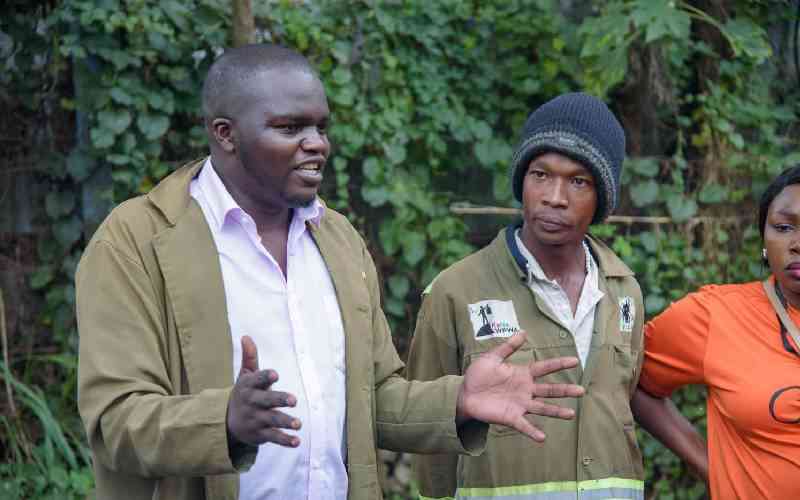
For Teddy, waste picking has been more than just a job—it has been a lifeline. “Becoming a waste picker got me off the streets,” he says. “As the eldest child, my parents depend on me, and I help support my younger siblings. I’d rather do this honest work than get involved in anything illegal.”
But the journey hasn’t been easy. In the beginning, Teddy faced stigma and ridicule from his community. “People thought I was a chokoraa or mentally ill just because I was collecting garbage,” he says. “It was hard, but I knew what I was doing had value.”
Every Saturday, Teddy joins his fellow collectors to cover hundreds of homes. The income he earns—about Sh400 a week—may seem small, but it makes a real difference in his household. “When I go home with Sh400, I give my mum Sh200 and keep the other half for my personal needs. That balance keeps me going,” he says.
Outside of waste picking, Teddy does occasional menial jobs to supplement his income, but it’s clear that his dedication to environmental action is not just about survival—it’s about dignity, purpose and building a cleaner future for Kibera.
Led by Brian Gisore Nyabuti as the founder and chairman Ali Yusuf, 27, the organisation employs a multi-pronged approach to waste management. Brian stands proudly beside a sturdy chair in their Kibera-based workshop.
At first glance, it appears like an ordinary bench, but it’s far from it. “This chair is made entirely from compressed plastic — polythene bags, PVC, plastic bottles, even nylon,” he explains. “Every type of plastic waste you can think of.”
The innovation didn’t start with big money or high-tech machinery. “We used what we had,” Brian says, pointing to a local contraption they fashioned into a heat press using iron box technology and later, affordable oven coils. “We created a crusher to break down the plastics, and then we press and mold them into furniture and building panels. Everything here is locally made — by locals, for locals.”
Stay informed. Subscribe to our newsletter
From discarded plastic, the team now manufactures a wide range of products — including outdoor benches, house numbering plaques, and even school furniture.
“We started this project in 2023 after connecting with Slum Dwellers International at the UN Habitat conference,” Brian recalls. “They saw our compressed plastic panels and thought they could be used for slum house numbering instead of wood.”That idea sparked a groundbreaking project. SGGC was commissioned to produce 9,000 house number plates for informal settlements like Mathare 4B, each selling for Sh650. The result? An impressive Sh5.8 million generated in just two years.
“It wasn’t just about money,” Brian says. “It was about mapping slums more efficiently and giving informal settlements structure. Each color-coded plaque — blue for hospitals, red for schools, yellow for churches, brown for households — has helped make sense of the maze-like layout of these communities.”
The group is now scaling further. One of their ongoing projects involves manufacturing heavy-duty plastic chairs and benches. These are being supplied to schools across Kibera through a sponsorship by a UK-based NGO and in partnership with Shining Hope for Communities (Shofco). “We’ve already identified 10 vulnerable schools that will receive these seats,” says Brian. “They are very durable — almost like concrete — and fire-resistant.
But how do they manage the manufacturing process with limited resources? “We have a special machine that works like a pressure cooker,” Brian says. “It has a compressor, a heating cylinder and a combustion chamber that burns used oil, not electricity. We collect waste oil from petrol stations and garages. It’s cheap — about two or three dollars — and helps us reduce our production costs.”
But even with progress, challenges remain. “Many people in the informal settlements still believe it’s the government’s job to collect waste,” Ali says. “But the truth is, the government doesn’t provide these services here. Unlike formal estates, we don’t have a structured county waste collection system. So we stepped in as community members to fill that gap.”
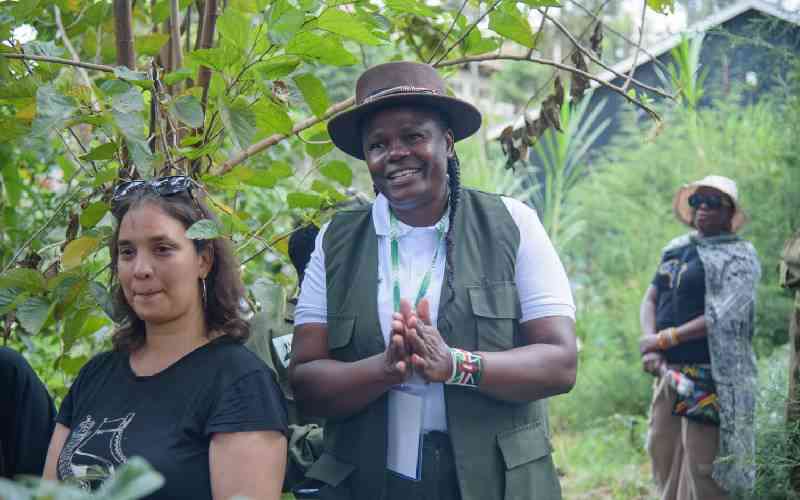
One major hurdle is behavioral — many residents still dump waste in open drains or rivers, despite SGGC charging a small fee of just 20 shillings per household for weekly waste collection. “People don’t want to pay,” Ali says. “They think it’s not their responsibility. That’s why our rivers get clogged, and during the rainy season, houses flood because the drainages are full of garbage.”
According to the World Health Organisation (WHO), the improper disposal and open burning of plastic waste — common in informal settlements like Kibera — release toxic chemicals into the air and soil. These chemicals are known to cause respiratory illnesses, cancers, endocrine disruption, and damage to reproductive and immune system.
A 2023 WHO report on “Health and Climate Change in Africa” highlights how slums across African cities, including Nairobi’s Kibera, suffer disproportionate health impacts due to climate-unfriendly waste practices. The plastics problem in Kibera, the report notes, is compounded by urban poverty, lack of infrastructure, and policy neglect — a toxic combination that deepens health inequalities.
For Yusuf, the lack of a formal policy governing community waste management is a critical gap. “Every group here is doing their own thing — no coordination, no guidance. We need a unified system and government support to make real progress.”
Still, the achievements of SGGC are tangible. Ali beams with pride as he recounts the human impact. “One of my proudest achievements is taking waste pickers out of the landfills, where they used to sleep, and helping them regain dignity,” he says. “Last year alone, we rehabilitated 25 waste pickers. Today, some are plumbers, others are masons and a few work inside homes.”
The initiative also equips members with financial literacy. Through a Village Loaning and Saving Association (VSLA), waste pickers save part of their earnings each week.
Femnet’s Roselyne Ashley Ochuka, known as Mama Mazingira, praised the initiative. “As African feminist climate activists, we must empower communities with green businesses,” she said. “Women and girls suffer most from climate impacts, but they are also leading solutions.”
Ali, sums up the spirit of SGGC: “It’s teamwork. Creating jobs alone is tough, but together we can transform our community. To the youth of Kibera, I say: join a group that aligns with your dreams. Be part of the change.” For years, waste pickers have operated in the shadows — unrecognised by county governments, unpaid by municipal contracts and unprotected by labor laws. That’s slowly changing.
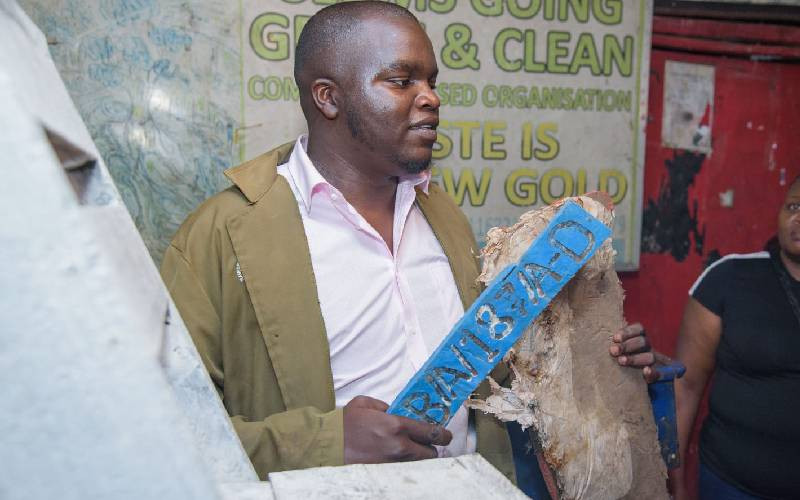
The Kenya National Waste Pickers Welfare Association, formed in 2021, is lobbying for the inclusion of waste pickers in the country’s waste management plans. FEMNET has thrown its weight behind them too, linking gender justice to climate action.
“These youths are doing climate justice work,” says Anne Tek, Climate justice Coordinator at FEMNET during a recent visit. “They are feminists. They are environmentalists. They are frontline warriors.”
In addition to recycling, the group has started urban farming projects — growing vegetables on vertical sack gardens and rooftop spaces.
“In a place like Kibera where food is expensive and land is scarce, farming is revolutionary,” says Yusuf. “We grow sukuma wiki, onions and tomatoes on land no one wanted. We even compost food waste to make our own fertilizer.”
You may also like...
Diddy's Legal Troubles & Racketeering Trial

Music mogul Sean 'Diddy' Combs was acquitted of sex trafficking and racketeering charges but convicted on transportation...
Thomas Partey Faces Rape & Sexual Assault Charges

Former Arsenal midfielder Thomas Partey has been formally charged with multiple counts of rape and sexual assault by UK ...
Nigeria Universities Changes Admission Policies

JAMB has clarified its admission policies, rectifying a student's status, reiterating the necessity of its Central Admis...
Ghana's Economic Reforms & Gold Sector Initiatives

Ghana is undertaking a comprehensive economic overhaul with President John Dramani Mahama's 24-Hour Economy and Accelera...
WAFCON 2024 African Women's Football Tournament

The 2024 Women's Africa Cup of Nations opened with thrilling matches, seeing Nigeria's Super Falcons secure a dominant 3...
Emergence & Dynamics of Nigeria's ADC Coalition

A new opposition coalition, led by the African Democratic Congress (ADC), is emerging to challenge President Bola Ahmed ...
Demise of Olubadan of Ibadanland
Oba Owolabi Olakulehin, the 43rd Olubadan of Ibadanland, has died at 90, concluding a life of distinguished service in t...
Death of Nigerian Goalkeeping Legend Peter Rufai

Nigerian football mourns the death of legendary Super Eagles goalkeeper Peter Rufai, who passed away at 61. Known as 'Do...
